八年级英语下册-Unit-7-10知识点详解
人教版丨八年级下册英语第7单元单词,重点句型,词汇讲解

人教版丨八年级下册英语第7单元单词/重点句型/词汇讲解Unit 7单词(音标)square 平方;正方形meter 米;公尺deep 深的;纵深的desert 沙漠population 人口;人口数量Asia 亚洲feel free (可以)随便(做某事)tour 旅行;旅游tourist 旅行者;观光者Wall 墙amazing 令人大为惊奇的;令人惊喜(或惊叹)的ancient 古代的;古老的protect 保护;防护wide 宽的;宽阔的as far as l know 就我所知achievement 成就;成绩southwestern 西南的;西南方向的thick 厚的;浓的include 包括;包含freezing 极冷的;冰冻的condition 条件;状况take in 吸入;吞入(体内)succeed 实现目标;成功challenge 挑战;考验in the face of 面对(问题、困难等)achieve 达到;完成;成功force 力;力量nature 自然界;大自然even though 即使;虽然ocean 大海;海洋the Pacific Ocean 太平洋centimeter 厘米weigh 重量是……;称……的重量birth 出生;诞生at birth 出生时up to 到达(某数量、程度等);至多有;不多于adult 成年的;成人的;成人;成年动物bamboo 竹子endangered 濒危的research 研究;调查(用作名词时,重音可放在第一个音节)keeper 饲养员;保管人awake 醒着excitement 激动;兴奋walk into 走路时撞着fall over 绊倒illness 疾病;病remaining 遗留的;剩余的or so 大约artwork 图片;插图wild 野生的government 政府;内阁whale 鲸oil 油;食用油;石油protection 保护;保卫huge 巨大的;极多的Tenzing Norgay 丹增诺尔盖Edmund Hillary 埃德蒙希拉里Junko Tabei 田部井淳子Qomolangma 珠穆朗玛峰the Nile 尼罗河the Caspian Sea 里海(世界最大的咸水湖)the Sahara 撒哈拉沙漠the Yangtze River 长江the Yellow River 黄河the Ming Dynasty 明朝the Ming Great Wall 明长城the Himalayas 喜马拉雅山脉the Amazon River 亚马逊河[05:09.98]Chengdu Research Base 成都研究基地Unit7 知识梳理【重点短语】1. as big as 与……一样大2. one of the oldest countries 最古老的国家之一3. feel free to do sth. 随意地做某事4. as far as I know 据我所知5. man-made objects 人造物体6. part of... ...... 的组成部分7. the highest mountain 最高的山脉8. in the world 在世界上9. any other mountain 其它任何一座山10. of all the salt lakes 在所有的咸水湖中11. run along 跨越……12. freezing weather 冰冻的天气13. take in air 呼吸空气14. the first people to do sth. 第一个做某事的人15. in the face of difficulties 面临危险16. give up doing sth. 放弃做某事17. achieve one’s dream 实现某人的梦想18. the forces of nature 自然界的力量19. reach the top 到达顶峰20. even though 虽然;尽管21. at birth 在出生的时候22. be awake 醒着23. run over with excitement 兴奋地跑过去24. walk into sb. 撞到某人25. fall over 摔倒26. take care of 照顾;照料27. every two years 每两年28. cut down the forests 砍伐林木29. endangered animals 濒危动物30. fewer and fewer pandas 大熊猫越来越少31. be in danger 处于危险之中32. the importance of saving these animals 拯救这些动物的重要性【重点句型】1.It is also very hard to take in air as you get near the top. 当你接近山顶时,连呼吸都会困难。
人教版八年级下册英语Unit 7单元语法知识点总结

人教版八年级下册英语Unit 7单元语法知识点总结本单元重点短语的具体用法1. as big as:与……一样大。
例如:This building is as big as that one.(这栋建筑和那栋一样大。
)2. feel free to do sth.:随意地做某事。
例如:You can feel free to ask me any questions.(你可以随意问我任何问题。
)3. one of the oldest countries:最古老的国家之一。
例如:China is one of the oldest countries in the world.(中国是世界上最古老的国家之一。
)4. risk their lives:拿生命冒险。
例如:The firefighters risk their lives to save people.(消防员们冒着生命危险去救人。
)5. as far as I know:据我所知。
例如:As far as I know, he is a very talented musician.(据我所知,他是一位非常有才华的音乐家。
)6. as you can see:正如你所看到的。
例如:As you can see, the weather is very nice today.(正如你所看到的,今天的天气非常好。
)7. be in danger:处于危险中。
例如:The pandas are in danger of extinction.(熊猫面临灭绝的危险。
)8. live up to:活到。
例如:People are living longer than ever before.(人们的寿命比以往任何时候都要长。
)9. part of...:……的组成部分。
例如:Reading is an important part of learning.(阅读是学习的重要组成部分。
Unit 7 知识点 2022-2023学年牛津译林版八年级英语下册

U7 International charities【comic & welcome】1.You have some pocket money left.have sth left剩下某物2.Hobo, let me have lunch first.first adv.首先常和next,then,finally等表顺序的副词一起使用,用来描述某件事情的先后顺序3.It helps build a better world for everyone, especially children all over the world. [especially] adv.特别,尤其修饰动词、形容词或整个句子;especial adj.特别的,特殊的4.It provides basic education for children in poor areas.[basic] adj.基础的,基本的basic education基础教育basic needs基本需求[education]不可数名词“教育” get/receive education接受教育educational adj.教育的;有教育意义的educate vt.教育;培养educate sb to do sth教育某人做某事educator n.教育家;教育工作者5.It works for the equal rights of girls and women too.[equal] adj.平等的,相等的,能胜任的equal rights平等的权利be equal to....等于,等同,能胜任[right] n.权利the right of sb某人的权利the right to... ... 的权利6.It also works to prevent the spread of some serious diseases, like AIDS, among young people. [prevent] vt.阻止,预防prevent sb (from) doing sth = stop / keep sb from doing sth阻止某人做某事prevent the spread of some serious diseases阻止一些严重疾病的传播[spread] ①n.扩散;分布;展开the spread of.... .... 的扩散①v.展开,传播;散布spread the news传播消息【reading】1.tell us something about blindness告诉我们有关失明的一些事情[blindness]不可数名词“失明”blind + ness adj+ness →n.类似的:kindness善良illness疾病happiness幸福carelessness粗心sadness悲伤business商业2.....mostly in poor areas , and about 80 per cent of these cases can be prevented or cured. [mostly] adv.主要地;大部分地;多半地≈mainly[cure] vt.治愈,治好cure sb of one’s illness治好某人的疾病3.However, many people don’t have money for medical treatment.[treatment] 可数名词或不可数名词“治疗” treat+ment medical treatment医学治疗4.The plane is also used as a training centre.be used as +工具、方式、手段被用作...be used for + 用途被用来...be used by sb 被某人使用be used in... 被用于....方面5.Many of our patients can’t afford to go to hospital.[patient] ①可数名词“病人,病患”①adj.能忍耐的,有耐心的be patient with sb 对某人有耐心[afford] vt.买得起;能做;承担+名词、代词、to do多用于否定句或疑问句中常与can、could、be able to连用afford to do sth承担得起做某事6.During my last visit,150 patients were operated on.[operate] vi.做手术,开刀operate on sb. = do an operation on sb给某人做某事7.I’m proud to help people see again and improve their lives.[proud] adj.自豪的,骄傲的be proud to do sth为做某事而自豪be proud of... 为...感到自豪be / feel proud that+从句很自豪....[pride]n.自豪,骄傲take pride in... = be proud of...8.Modern medicine is developing quickly and now most eye problems and diseases can be treated and cured.●[medicine] n.医学,药Modern medicine现代医学take the medicine吃药[medical] adj.医学的,医药的●[develop]v. 发展;加强develop into... 发展成...[developing]adj.发展中的[developed]adj.发达的[development]n.发展●[treat] vt. ①治疗treat sb/sth with sth 用某物治疗某人/某物treat sb for... 为某人治...病①对待;看待treat ... as.... 把...看作...carry on with sth继续做某事= carry on doing sth= go on doing sth= continue doing sth【grammar】1.[ hand out ] ①分发;发出= give out反义词:hand in 上交①提出(建议等)hand out advice提出建议2.[hold] vt. (held , held)①举行=have hold / have the sports meeting举行运动会①容纳The classroom can hold over 100students.这间教室能容纳100多名学生①握住,抓住hold one’s hand握住某人的手3.With its help, millions of poor children all over the country were given basic education. with one’s help = with the help of sb.在某人的帮助下without one’s help没有某人的帮助【integrated skills & study skills & task】1.What’s the matter?怎么了?what’s the matter (with sb?)= What’s wrong (with sb)?= What’s the trouble (with sb)?= What’s happened (to sb)?2.You’ll be all right in a few days.in a few days几天后in +一段时间→ How soon 提问3.I could not sleep at all that night.not ...at all一点儿也不;根本不not 通常与主语后面的连系动词be,情态动词或助动词等连用4.help poor people with eye problem帮助有眼部疾病的穷人5.learn about the conditions of the local people了解当地人的情况enter a school进入学校。
人教版英语八年级下册unit7单元知识点总结

2019-2020学年人教版英语八年级下册Unit 7 What’s the highest mountain in the world?知识点Section A部分知识点1.It’s 8,844 meters high. 它有8,844米高。
It is … meters high (long, wide,tall, thick, deep,old…).它是……米高(长,宽……)。
“有多长(宽,高……)”时:Tom is 10 years old. Tom is 1.2meters tall.基数词+度量(meters/feet/years)+形容词(high (long, wide,tall, thick, deep,old)2. 这个湖有多深? 1025米深。
How deep is the lake? It’s 1,o25 meters deep.3. How big is the Sahara?The Sahara is about 9,600,000 square kilometers in size.面积约960万平方千米。
4.China has the biggest population in the world.中国是世界上人口最多的国家。
population集合名词“人口,人口数量”;常用a~,the ~1)What’s the population of…?总人口多少?(用what提问,the population做主语,动词是单数is)2)India has a large population.印度人口众多。
(用large/big表多、small表少) China has a population of 1.3 billion.有13亿人口。
3)About sixty percent of the population in China are farmers.分数、百分数修饰population做主语时,动词是复数。
人教版八年级英语下册第七单元重点知识点梳理

人教版八年级英语下册第七单元重点知识点梳理Unit 7一、重点短语1.as…as…与……一样……2.feel free to do sth.随意地做某事3.as far as I know据我所知5.in the world在世界上5.take in air呼吸空气6.in the face of difficulties面临危险7.give up doing sth.放弃做某事8.achieve one's dream实现某人的梦想9.even though虽然;尽管10.at birth在出生的时候11.with excitement兴奋地12.walk into sb.撞到某人13.fall over摔倒14.take care of照顾;照料15.every two years每两年16.cut down砍倒,削减17.fewer and fewer越来越少18.be in danger处于危险之中19.the importance of………的重要性二、重点句型1.This makes it the longest wall in the world.这让它成了世界上最长的墙。
2.The main reason was to protect their part of the country.主要原因是为了保卫他们部分的国土。
3.As far as I know,there are no other manmake objects as big as this.就我所知,世界上没有比这个大的人造物体。
4.Of all the mountains,Qomolangma rises the highest.所有的山之中,珠穆朗玛峰耸立得最高。
5.It is also very hard to take in air as you get near the top.当你接近山顶的时候,呼吸也非常的困难。
八年级下册人教版英语unit7知识点
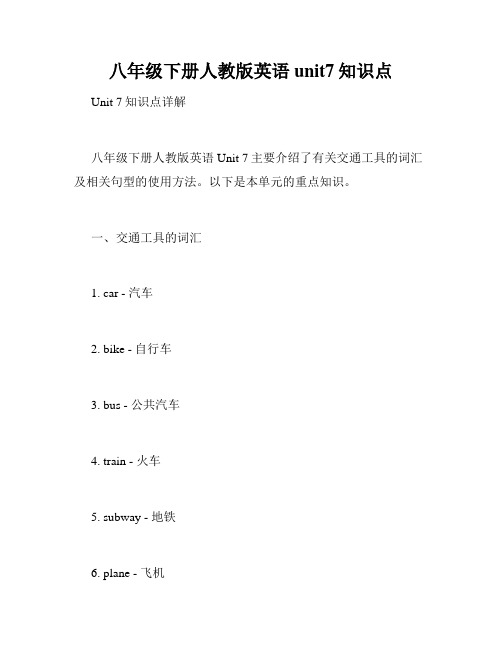
八年级下册人教版英语unit7知识点Unit 7知识点详解八年级下册人教版英语Unit 7主要介绍了有关交通工具的词汇及相关句型的使用方法。
以下是本单元的重点知识。
一、交通工具的词汇1. car - 汽车2. bike - 自行车3. bus - 公共汽车4. train - 火车5. subway - 地铁6. plane - 飞机7. ship - 船8. taxi - 出租车9. helicopter - 直升机10. boat - 小船二、交通工具的形容词1. fast - 快速的2. slow - 慢的3. comfortable - 舒适的4. crowded - 拥挤的5. noisy - 吵闹的6. convenient - 方便的7. dangerous - 危险的三、询问交通信息的常用句型1. How do you usually go to school/work? - 你通常怎么去学校/上班?2. How long does it take you to get to school/work? - 你到学校/上班需要多长时间?3. Which do you prefer, a bike or a car? - 你更喜欢自行车还是汽车?4. Have you ever taken a train/plane/ship? - 你坐过火车/飞机/船吗?5. Is it far from here to the airport/station? - 从这里到机场/车站远吗?四、交通安全的表达方式1. Wear your seat belt. - 系好你的安全带。
2. Don't drink and drive. - 不要酒后驾车。
3. Obey traffic rules. - 遵守交通规则。
4. Look both ways before crossing the street. - 过马路之前向两边看。
Unit 7知识点详解及练习 人教版英语八年级下册讲义
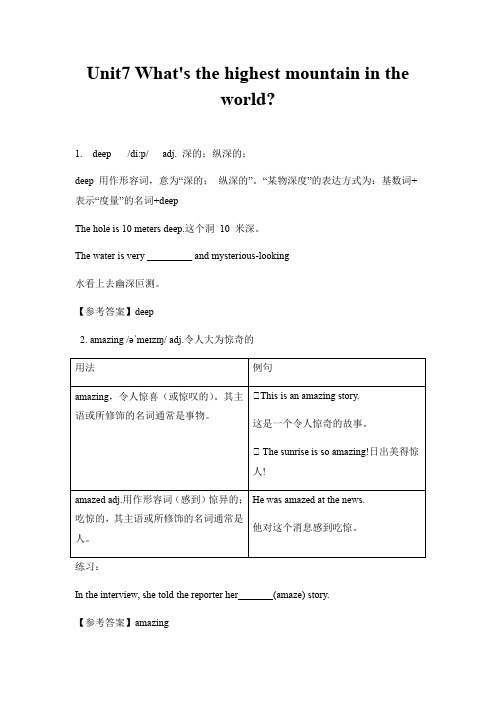
Unit7 What's the highest mountain in theworld?1. deep/di:p/adj. 深的;纵深的;deep 用作形容词,意为“深的;纵深的”。
“某物深度”的表达方式为:基数词+表示“度量”的名词+deepThe hole is 10 meters deep.这个洞10 米深。
The water is very _________ and mysterious-looking水看上去幽深叵测。
【参考答案】deep2. amazing /əˈmeɪzɪŋ/ adj.令人大为惊奇的练习:In the interview, she told the reporter her_______(amaze) story.【参考答案】amazing3. tour/ tʊə(r) / n./v. 旅行;旅游Every year, a large number of______(tour) come here and visit birds.【参考答案】tourists4.protect/prəˈtekt/ v. 保护;防护The police give us so much_______(protect).【参考答案】protection5. thick/θɪk /adj. 厚的;浓的It would take me a long time to read such a _________book.( thick )【参考答案】thick6.include/ ɪnˈklu:d / v. 包括;包含。
My job in the company doesn't_____cleaning rooms for them.A. sendB. includeC. fitD. take【参考答案】B7. freezing/ˈfri:zɪŋ/adj. 极冷的;冰冻的The weather is ________ cold today!【参考答案】freezing8.succeed/ səkˈsi:d /v.实现目标;成功用所给词的适当形式填空。
人教版丨八年级下册英语7单元知识点总结
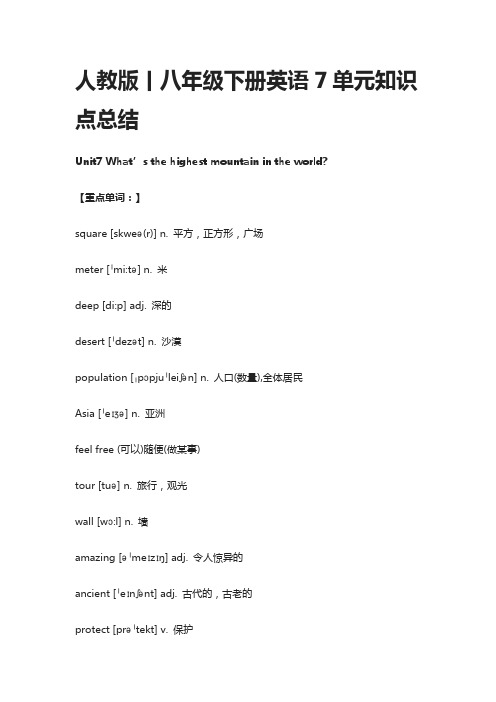
人教版丨八年级下册英语7单元知识点总结Unit7 What’s the highest mountain in the world?【重点单词:】square [skweə(r)] n. 平方,正方形,广场meter [ˈmi:tə] n. 米deep [di:p] adj. 深的desert [ˈdezət] n. 沙漠population [ˌpɔpjuˈleiʃən] n. 人口(数量),全体居民Asia [ˈeɪʒə] n. 亚洲feel free (可以)随便(做某事)tour [tuə] n. 旅行,观光wall [wɔ:l] n. 墙amazing [əˈmeɪzɪŋ] adj. 令人惊异的ancient [ˈeɪnʃənt] adj. 古代的,古老的protect [prəˈtekt] v. 保护wide [waɪd] adj. 宽的,广阔的as far as I know 就我所知achieve [əˈtʃi:v] v. 完成,实现achievement [əˈtʃi:vmənt] n. 成就,成绩southwestern [saʊθ'westən] adj. 西南的,西南方向的thick [θɪk] adj. 厚的,浓的include [ɪnˈklu:d] v. 包括,包含freezing [ˈfri:zɪŋ] adj. 极冷的,冷冻的condition [kənˈdɪʃn] n. 条件,状况take in 吸入,吞入succeed [səkˈsi:d] v. 成功,实现目标,完成challenge [ˈtʃælɪndʒɪŋ] n. & v. 挑战,考验in the face of 面对(问题,困难)force [fɔ:s] n. 力,力量nature ['neɪtʃə(r)] n. 自然界,大自然even though(=even if) 即使,虽然ocean ['əʊʃn] n. 海洋the Pacific Ocean 太平洋cm(centimeter) [ˈsentɪˌmi:tə] n. 厘米weigh [wei] v. 称…重量birth [bɜ:θ] n. 出生,诞生at birth 出生时up to 到达(某数量,程度),不多于adult [ əˈdʌlt] n. 成年人bamboo [bæmˈbu:] n. 竹子endangered [ɪnˈdeɪndʒəd] adj. 有危险的,濒临灭绝的,濒危的research [rɪˈsɜ:tʃ] n. & v. 研究,调查keeper [ˈki:pə(r)] n. 饲养员,保管人awake [əˈweɪk] adj. 醒着excitement [ɪkˈsaɪtmənt] n. 激动,兴奋walk into 走路时撞到fall over 绊倒illness [ˈɪlnəs] n. 疾病,生病remaining [rɪˈmeɪnɪŋ] adj. 遗留的,剩余的or so 大约artwork [ˈɑ:twə:k] n. 艺术品,插图,图片wild [waɪld] adj. 野性的,野生的government [ˈgʌvənmənt] n. 政府whale [weɪl] n. 鲸protection [prəˈtekʃn] n. 保护,保卫huge [hju:dʒ] adj. 巨大的,极多的dynasty [ˈdɪnəstɪ] n. 朝代,王朝base [beɪs] n. 基础,基地【重点词组】1. the population of China 中国的人口2. one of the oldest countries 最古老的国家之一3. feel free to do sth. 随意地做某事4. as far as I know 据我所知as you can see,..正如你所看见的,…5. man-made objects 人造物体6. part of... ...... 的组成部分Badaling is part of Ming Great Wall.7. mountain climbing/ climbing mountains 登山运动8,live up to 活到……9.higher than any other mountain 比其他任何一座山高10. of all the salt lakes 在所有的咸水湖中11. run along 绵延,横亘……12. another 200 or so还有大约200左右13,one of the world’s most dangerous sports 最危险的运动之一14,one of the most popular places最受欢迎的地方之一15,of all the mountains所有的山之中16,freezing weather conditions冰冻的天气条件17,risk their lives冒着他们的生命危险18, challenge oneself挑战自我challenge ourselves19, in the face of difficulties 面临困难20, take in air 呼吸空气21. the first people to do sth. 第一个做某事的人the first people to reach the top22. give up doing sth. 放弃做某事23. achieve one’s dream 实现某人的梦想= make one’s dream come true24. the forces of nature 自然界的力量25. reach the top 到达顶峰26. even though 虽然;尽管27. at birth 在出生的时候28. be awake 醒着29. run over with excitement 兴奋地跑过去30. walk into sb. 撞到某人die from……死于……31. fall over 被…绊倒fall over the chair 被椅子绊倒、32. take care of 照顾;照料33. every two years 每两年34. cut down the forests 砍伐林木35. endangered animals 濒危动物36. fewer and fewer pandas 大熊猫越来越少37. be in danger 处于危险之中38. the importance of saving these animals 拯救这些动物的重要性39,wild animals野生动物sea life海洋生物40 ,rules on whale protection保护鲸的规定(on 关于)41.water pollution水污染,42only live for a short time because of illnesses由于疾病仅活很短的时间43,make more homes for the pandas为大熊猫建造更多的家园43. stand on two legs 两腿站立44,catch whales for meat, fat and oil为肉,脂肪和油而捕鲸45,stop putting rubbish into the sea停止往大海里丢垃圾46,jump high out of the water高高地跃出水面47,protect …from…保护…免于…的伤害protect children from catching a cold. 保护孩子免于感冒48,bamboo forests竹林49,panda keeper熊猫饲养员50,in the remaining forests在剩下的森林里51,the highest mountain in the world (Qomolangma)世界上最高的山52,the biggest desert in the world (the Sahara)世界上最大的沙漠53,the longest river in the world (the Nile)世界上最长的河54,the deepest of all the salt lakes (the Caspian Sea)所有咸水湖中最深的湖【重点句型】1. It is -\~adj. + (fo r sb. ) to do sth.It is also very hard to take in air as you get near the top. 当你接近山顶时,连呼吸都会困难。
人教版八年级英语下册Unit7what's_the_highest_mountain_in_the_world知识点归纳与总结及练习

Unit 7 W hat’s the highest mountain in the world?重难点解析和练习附参考答案一、重点短语1. as big as 与……一样大as…….as 与…..一样(形容词副词) 同级比较中间加形容词副词原型2. one of the oldest countries 最古老的国家之一one of +the 形容词最高级+可数名词复数最……之一3. feel free to do sth. 随意地做某事4. as far as I know 据我所知(可用在作文当中发表自己的观点)In my opioion5. in the world 在世界上同义短语有:all over the world around the world throughout the world6. any other mountain 其他任何一座山7. of all the salt lakes 在所有的咸水湖中8. run along 跨越… …9. freezing weather 冰冻的天气10. take in air 呼吸空气11. the first people to do sth. 第一个做某事的人12. in the face of difficulties 面临危险13. give up doing sth. 放弃做某事14. achieve one’ s dream 实现某人的梦想15. even though 虽然;尽管= even if as if= as though好像16. be awake 醒着wake up 醒来,叫醒17. run over with excitement 兴奋地跑过去18. walk into sb. 撞到某人19 fall over 摔倒20. take care of 照顾;照料=look after= care for take care 当心,保重21. every two years 每两年表频率相当于once two years二、知识点详解1. Feel free to ask me anything on today’s Great Wall tour.在今天的长城游中,大家尽管问我任何问题,不要拘束。
人教版八年级下册英语:Unit 10 重点短语、重点句型、交际用语、语法、书面表达范文汇编(全面!)
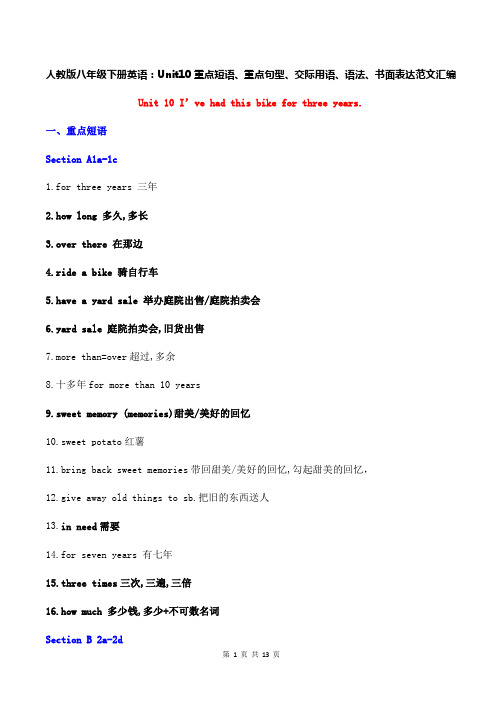
人教版八年级下册英语:Unit10重点短语、重点句型、交际用语、语法、书面表达范文汇编Unit 10 I’ve had this bike for three years.一、重点短语Section A1a-1c1.for three years 三年2.how long 多久,多长3.over there 在那边4.ride a bike 骑自行车5.have a yard sale 举办庭院出售/庭院拍卖会6.yard sale 庭院拍卖会,旧货出售7.more than=over超过,多余8.十多年for more than 10 years9.sweet memory (memories)甜美/美好的回忆10.sweet potato红薯11.bring back sweet memories带回甜美/美好的回忆,勾起甜美的回忆,12.give away old things to sb.把旧的东西送人13.in need需要14.for seven years 有七年15.three times三次,三遍,三倍16.how much 多少钱,多少+不可数名词Section B 2a-2d17.toy bear 玩具熊18.toy lion 玩具狮子19.toy tiger 玩具老虎20.bread maker 面包机21.g ive away 赠送22.not.. anymore=no more 不再…23.not ...any longer=no longer不再24.soft toys 步绒玩具,软体玩具,毛绒玩具25.keep the bear保留玩具熊26.welcome to sp. 欢迎到某地27.the Sunshine Home for Children 阳光儿童之家28.have something for the kids/children有东西送给孩子们29.for a couple of months 有几个月30.a couple of两个,几个,一对31.a bit =a little =a little bit =kind of 有点32.check out 察看,观察,看看33.board games 棋类游戏34.one last thing 最后一件东西35.for a long time 有很长一段时间36.Thanks so much!= Thanks a lot!= Thank you very much!非常感谢,多谢! Section A 3a-3c37.长大grow up38.in junior high school 在上中学/初中39.in a yard sale 在庭院售卖会/旧货出售活动中40.give the money to 把钱捐给......41.a children’s home 儿童之家,孤儿院42.clear out 清理,清理出来,丢掉43.a lot of =many =lots of =a number of 许多,大量44.at first =first of all= to begin with一开始,首先45.许多东西a lot of things46.play with玩耍47.for example/instance 例如48.own a train and railway set 拥有一套火车和铁路轨道的玩具49.every week 每个星期50.toy monkey 玩具猴51.next to 在......旁边52.在猴子旁边next to the monkey53.睡在猴子旁边sleep next to the monkey54.55.every night 每天晚上56.part with放弃,交出,和......分开57.as for me 对我来说,至于我58.as for至于,关于59.give up 放弃60.football shirts足球服,橄榄球衣61.to be honest 说实在的62.for a while 有一段时间63.with the money 用钱64.考虑,思考,认为,想过think about65.even though =even if = although =though 虽然,尽管,即使Section A Grammar Focus-4c66.踢足球play football=play soccer ball67.in Japan 在日本68.three days ago三天前69.有三天for three days70.ten hours ago 十小时以前71.for ten hours有十个小时72.have a camera有一个摄影机/摄像机73.three years ago三年前74.on Monday在星期一75.生病become ill76.water park水上乐园,水上公园77.next month 下个月78.have a dog=keep a dog 饲养狗,养狗79.有一架钢琴have a piano80.from the Li family从/跟李家(买的81.move to the US 搬到美国st year 去年83.be back to =come back to =get back to回到,回来84.f or two years 有两年85.a lot =very much 非常,很,常常86.for over 20 years 20多年87.in this small town 在这个小城里,在这个小镇里Section B 1a-1d88.high school 高中,中学,高级中学89.middle school中学,初级中学90.primary school小学91.live in 居住92.在周末on weekends= on the weekend93.镇图书馆town library94.科学博物馆science museum95.沿街饭店restaurant down the street96.a concert hall音乐厅,歌厅97.for at least 20 years 至少有20年Section B 2a-2d98.(be the same as和......一样)99.(in the passage 在这篇短文里/文章中)lions of 许多,上百万,数百万101.leave the countryside 离开农村/乡村102.每年every year103.how often 多久一次104.hometown feeling家乡情怀105.once or twice a year=one or two times a year一年一到两次106.search for work 找工作107.寻找look for=search for108.in the cities 在城市里,到城市里109.for the last 13 years=for the past three years 在过去的13年里110.with a hard job工作非常辛苦111.in a crayon factory在蜡笔厂112.much time 许多时间113.return home =get back home=come back home=be back home 回家114.at least 至少115.once a year 一年一次116.for almost three years 几乎有三年117.regard with great interest=become interested in=be interested in =take aninterest in 对......感兴趣,以浓厚的兴趣关注着rge hospitals大医院119.build new school建盖新学校120.send teachers from从......派老师来121.......真实的一面be true of122.learn to read and count学会阅读和数数123.20世纪中期the mid-20th century124.always stay the same一成不变,保持老样子125.according to依据;按照126.opposite the school=across from the school学校对面127.become quite a symbol of the place 成为这个地方的象征/标志128.most of the children大多数孩子们129.一起玩play together130.under that big tree 在那棵大树下面131.during the summer holidays在暑假期间132.such a happy childhood多么快乐的童年133.leave many soft and sweet memories 留下许多温柔甜美的回忆134.in one’s heart在某人心目中,在某人心中135.t hese days=now =at present= at the moment 目前;现在136.回到return to137.in close to three years 在近三年在138.几乎,接近close to139.拥有/承载着所有儿时的记忆hold all sb.’s childhoodSection B 3a-Self Check140.把某物给某人give sth. to sb.141.如此,这么,那么,非常so much142.在第一段in the first paragraph143.在第二段in the second paragraph144.对某人很特别/特殊be special to sb.145.在第三段in the third paragraph146.玩电子游戏play computer games147.so far=up to now 迄今;到现在为止,目前为止148.in Beijing在北京149.for about two years 大约有两年150.回到美国be back to the US/the America/the United States/the U.S.A 151.move to China 搬到中国152.去那里go there153.10 years old 十岁154.把……看做regard…as…二、重点句型及知识点Section A 1. I learned how to ride a bike on it.我学会了怎样骑自行车。
Unit7-10语法梳理及真题演练-人教版八年级英语下册

1. A is taller than B 2. 两者中较...的那个 A is the taller the two
汤姆是两个男孩中较高的那个。 Tom is the taller of the two boys.
A. has gone to
B. has been to
C. went to
D. will go to
8.--Have you seen The Wanderig Earth ____?
--Yes, I've_____seen it,
A. yet; already B. yet; yet
C. already; yet
just
刚刚
yet
还
+时间段 长达多久
so far
到目前为止
第几次做某事用现 在完成时表示,
It’s the second time that...have done sth)
【注意】I have already had breakfast.
I haven't done my homework yet.
6.--____have you worked here?--For just one month.
A. How often
B. How long
C. How soon
D. How much
7. --Where is Angelina? I haven't seen her for days.
--She___Wuhu. She'll be back next week.
人教版八年级英语下册Unit7单词讲解课件
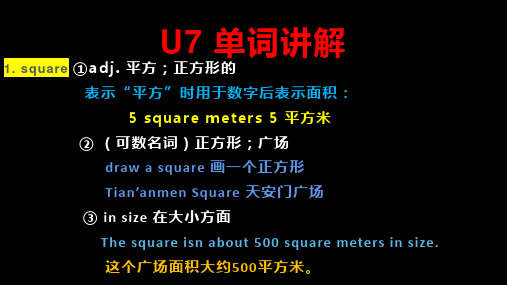
a big success一个大的成功
21.challenge v./n. 挑战; 考验 构成: challenge sb. to do sth向某人挑战做某事 challenge oneself挑战自己 the challenge of ...的挑战
①〔名词〕研究;调查常与动词(短语)do,make 等连用,表示“做/进行研究”, 其后可接介词on,into等引出研究的内容。
The research shows that napping for about an hour is the best. 研究表明小睡大约一个小时是最好的。 I'm doing some research on Chinese history. 我正在研究中国历史。 ②〔动词〕研究;调查 其后常接介词into,表示“对······进行研究”。 They're researching into the causes of cancer. 他们正在研究癌症的起因
research 的复数 形式通常不与 many或数词连用
33. 辨析:awake 与 wake awake adj. 醒着
wake v. 弄醒;醒
构成 be awake 反义词 be asleep 构成 wake up 在句中作谓语
Is he awake or asleep? 他醒着还是睡着了?
7. tour ①【可数名词】旅行;旅游 a tour around the world 环球之旅 ② tour+ist= tourist n. 旅行者;观光者
人教版英语八年级下册unit7--unit810单元知识点讲解+练习题张

5. We must consider how ___A_____ this
problem quickly. There is little time left.
A. to solve
B. solve
C. solving
D. solved
6. Jack hasn’t taken his piano lessons for a long time. He is considering ___C_____ them.
D. n. 行业;活动范
围
熟 E. v. 沿……形成行(或列、排) 词 (1)There was a line of trees on either side of the
新 road.________ A
义 (2)(2017株洲阅读技能A)Our lines can get very busy, but please keep trying and you will soon get
D. yet
8. —Have you had the English test ________?
—NoC, not yet. But we have had the math test
already.
A. already
B. still
C. yet
D. hardly
9. I have ________ told Bob the good news.
考向1:population是名词,意为“人口; 人口数量”,作主语时谓语动词要用单数形式。 当其前面有分数或百分数等词修饰时,表示整 体中的一部分人,谓语动词用复数形式。如: On the one hand, more than three quarters of the population are Chinese, so you can simply speak Putonghua a lot of the time.一方面,超 过3/4的人口都是中国人,所以你可以随时随 地只讲普通话。[八(下)Unit 9 P 70]
人教版八年级下册Unit 7 Whats the highest mountain in the world知识点详解
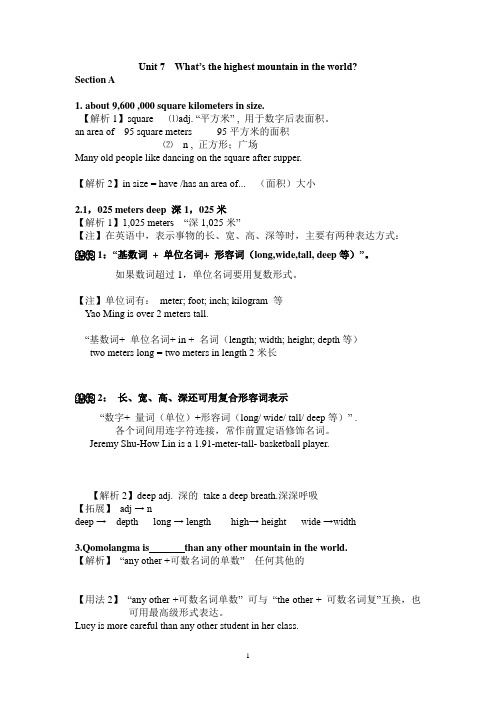
Unit 7 What’s the highest mountain in the world?Section A1.about 9,600 ,000 square kilometers in size.【解析1】square ⑴adj. ―平方米‖ , 用于数字后表面积。
an area of 95 square meters 95平方米的面积⑵n , 正方形;广场Many old people like dancing on the square after supper.【解析2】in size = have /has an area of... (面积)大小2.1,025 meters deep 深1,025米【解析1】1,025 meters ―深1,025米‖【注】在英语中,表示事物的长、宽、高、深等时,主要有两种表达方式:结构1:“基数词+ 单位名词+ 形容词(long,wide,tall, deep等)”。
如果数词超过1,单位名词要用复数形式。
【注】单位词有:meter; foot; inch; kilogram 等Yao Ming is over 2 meters tall.―基数词+ 单位名词+ in + 名词(length; width; height; depth等)two meters long = two meters in length 2米长结构2:长、宽、高、深还可用复合形容词表示―数字+ 量词(单位)+形容词(long/ wide/ tall/ deep等)‖ .各个词间用连字符连接,常作前置定语修饰名词。
Jeremy Shu-How Lin is a 1.91-meter-tall- basketball player.【解析2】deep adj. 深的take a deep breath.深深呼吸【拓展】adj → ndeep → depth long → length high→ height wide →width3.Qomolangma is than any other mountain in the world.【解析】―any other +可数名词的单数‖ 任何其他的【用法2】―any other +可数名词单数‖ 可与―the other + 可数名词复‖互换,也可用最高级形式表达。
Unit7基础知识人教版八年级英语下册
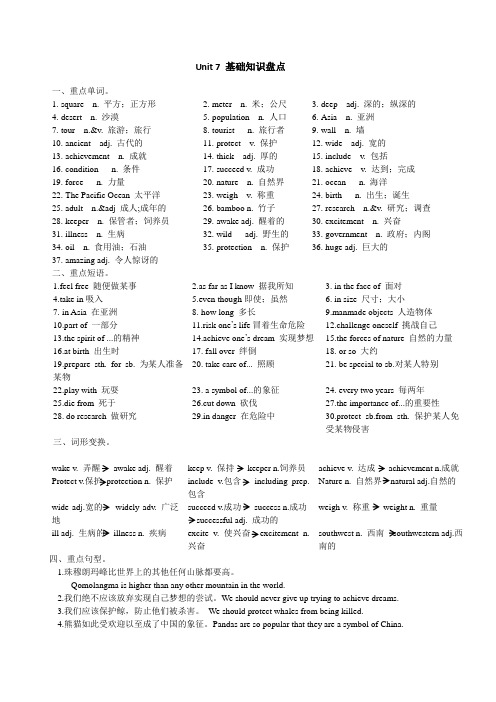
四、重点句型。
1.珠穆朗玛峰比世界上的其他任何山脉都要高。
Qomolangma is higher than any other mountain in the world.2.我们绝不应该放弃实现自己梦想的尝试。
We should never give up trying to achieve dreams.3.我们应该保护鲸,防止他们被杀害。
We should protect whales from being killed.4.熊猫如此受欢迎以至成了中国的象征。
Pandas are so popular that they are a symbol of China.一、重点单词。
1. square n. 平方;正方形2. meter n. 米;公尺3. deep adj. 深的;纵深的4. desert n. 沙漠5. population n. 人口6. Asia n. 亚洲7. tour n.&v. 旅游;旅行 8. tourist n. 旅行者 9. wall n. 墙10. ancient adj. 古代的 11. protect v. 保护 12. wide adj. 宽的13. achievement n. 成就 14. thick adj. 厚的 15. include v. 包括16. condition n. 条件 17. succeed v. 成功 18. achieve v. 达到;完成19. force n. 力量 20. nature n. 自然界 21. ocean n. 海洋22. The Pacific Ocean 太平洋 23. weigh v. 称重 24. birth n. 出生;诞生25. adult n.&adj 成人;成年的 26. bamboo n. 竹子 27. research n.&v. 研究;调查28. keeper n. 保管者;饲养员 29. awake adj. 醒着的 30. excitement n. 兴奋31. illness n. 生病 32. wild adj. 野生的 33. government n. 政府;内阁34. oil n. 食用油;石油 35. protection n. 保护 36. huge adj. 巨大的37. amazing adj. 令人惊讶的 二、重点短语。
Unit10重点单词详解人教版八年级英语下册
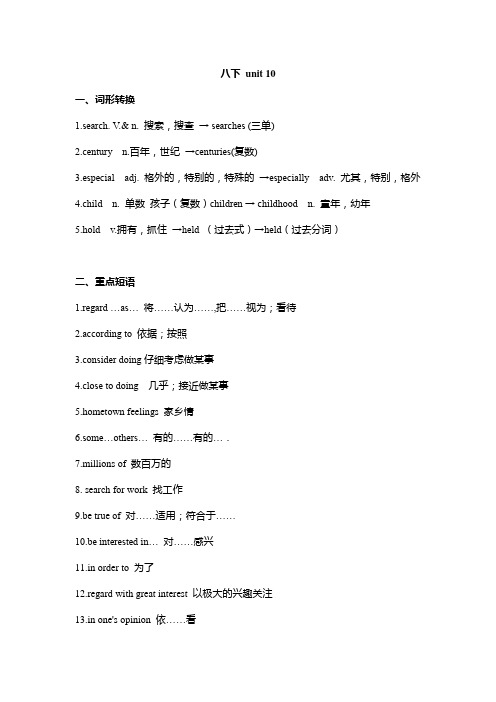
八下unit 10一、词形转换1.search. V.& n. 搜索,搜查→ searches (三单)2.century n.百年,世纪→centuries(复数)3.especial adj. 格外的,特别的,特殊的→especially adv. 尤其,特别,格外4.child n. 单数孩子(复数)children → childhood n. 童年,幼年5.hold v.拥有,抓住→held (过去式)→held(过去分词)二、重点短语1.regard …as… 将……认为……,把……视为;看待2.according to 依据;按照3.consider doing仔细考虑做某事4.close to doing 几乎;接近做某事5.hometown feelings 家乡情6.some…others… 有的……有的….lions of 数百万的8. search for work 找工作9.be true of 对……适用;符合于……10.be interested in… 对……感兴11.in order to 为了12.regard with great interest 以极大的兴趣关注13.in one's opinion 依……看14.across from 在……的对面15. once or twice a year=one or two times a year 一年一两次三、重点单词详解1. for/sincefor与表示一段时间的词连用,表示“做某事多长时间了”,常用于现在完成时,表示从过去某时开始,持续到现在的动作或状态since作连词,引导时间状语从句,从句用一般过去时,主句常用完成时。
since还可以作介词,连接一个过去的时间点或一段时间+ago2. considerconsider作动词,意为“考虑、认为”3. certaincertain作形容词,意为“某种;某事;某人”certain作形容词,意为“确定的;无疑的”be certain / sure of sth. 对某事有把握be certain / sure to do sth. 肯定做某事4. a 46yearold岁数的表达方式基数词+ years old。
八年级下册仁爱版英语unit7知识点
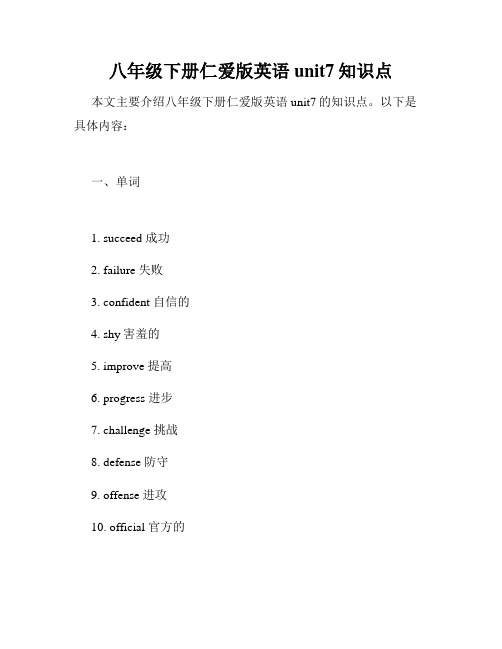
八年级下册仁爱版英语unit7知识点本文主要介绍八年级下册仁爱版英语unit7的知识点。
以下是具体内容:一、单词1. succeed 成功2. failure 失败3. confident 自信的4. shy害羞的5. improve 提高6. progress 进步7. challenge 挑战8. defense 防守9. offense 进攻10. official 官方的二、词组1. be confident in 有自信2. be nervous about 对......感到紧张3. make progress 取得进步4. take on 挑战,承担5. be good at 擅长于6. be interested in 对......感兴趣7. be proud of 为......感到自豪三、语法1. 直接引语和间接引语例如:He said, "I am interested in basketball." (直接引语) He said that he was interested in basketball. (间接引语)2. 动词时态例如:She is confident in her ability. (现在时)She was confident in her ability. (过去时)3. 比较级和最高级例如:Playing basketball is more interesting than playing football.Basketball is the most interesting sport.四、文化背景1. 篮球的起源和发展2. 美国篮球联盟(NBA)的历史和文化地位3. 篮球是学校体育教育中的一项重要内容以上就是八年级下册仁爱版英语unit7的主要知识点介绍。
学生可以通过掌握这些单词、短语、语法和文化背景,更好地理解和运用本单元所学知识,提高英语水平。
牛津英语八年级下册Unit7知识点总结
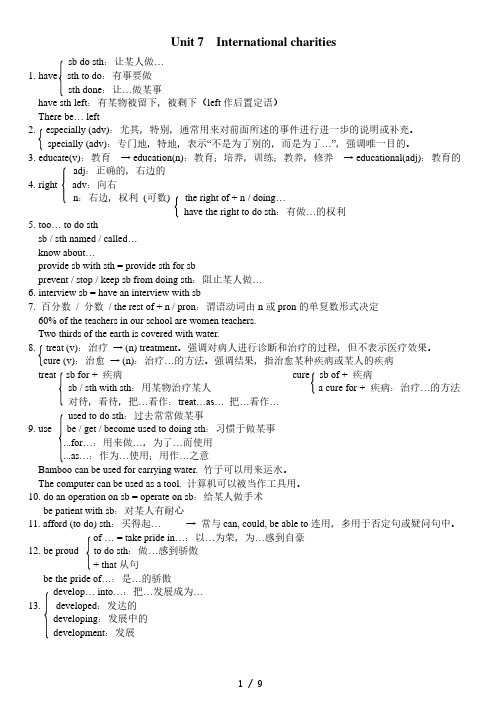
Unit 7 International charitiessb do sth:让某人做…1. have sth to do:有事要做sth done:让…做某事have sth left:有某物被留下,被剩下(left作后置定语)There be… left2. especially (adv):尤其,特别,通常用来对前面所述的事件进行进一步的说明或补充。
specially (adv):专门地,特地,表示“不是为了别的,而是为了…”,强调唯一目的。
3. educate(v):教育→ education(n):教育;培养,训练;教养,修养→ educational(adj):教育的adj:正确的,右边的4. right adv:向右n:右边,权利(可数) the right of + n / doing…have the right to do sth:有做…的权利5. too… to do sthsb / sth named / called…know about…provide sb with sth = provide sth for sbprevent / stop / keep sb from doing sth:阻止某人做…6. interview sb = have an interview with sb7. 百分数/ 分数/ the rest of + n / pron:谓语动词由n或pron的单复数形式决定60% of the teachers in our school are women teachers.treat sb for + 疾病cure sb of + 疾病sb / sth with sth:用某物治疗某人 a cure for + 疾病:治疗…的方法对待,看待,把…看作:treat…as…把…看作…used to do sth:过去常常做某事9. use be / get / become used to doing sth:习惯于做某事...for…:用来做…,为了…而使用...as…:作为…使用;用作…之意Bamboo can be used for carrying water. 竹子可以用来运水。
牛津译林版八年级英语下册unit7单元知识点归纳总结
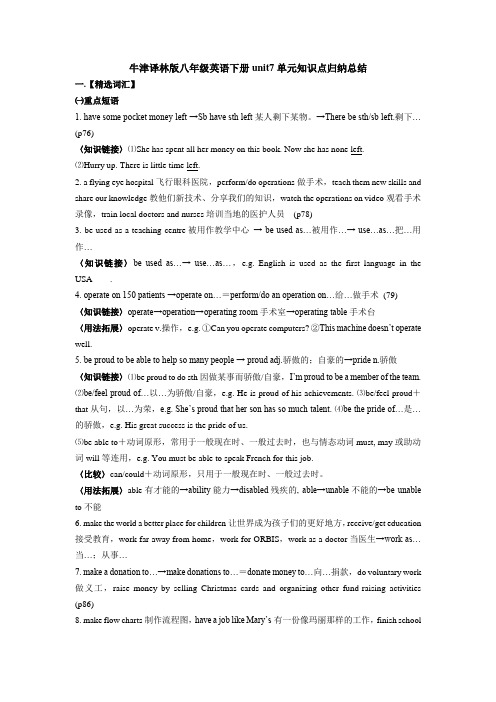
牛津译林版八年级英语下册unit7单元知识点归纳总结一.【精选词汇】㈠重点短语1. have some pocket money left →Sb have sth left某人剩下某物。
→There be sth/sb left.剩下… (p76)〈知识链接〉⑴She has spent all her money on this book. Now she has none left.⑵Hurry up. There is little time left.2. a flying eye hospital飞行眼科医院,perform/do operations做手术,teach them new skills and share our knowledge教他们新技术、分享我们的知识,watch the operations on video观看手术录像,train local doctors and nurses培训当地的医护人员(p78)3. be used as a teaching centre被用作教学中心→ be used as…被用作…→ use…as…把…用作…〈知识链接〉be used as…→ use…as…,e.g. English is used as the first language in the USA.4. operate on 150 patients →operate on…=perform/do an operation on…给…做手术(79)〈知识链接〉operate→operation→operating room手术室→operating table手术台〈用法拓展〉operate v.操作,e.g. ①Can you operate computers? ②This machine doesn’t operate well.5. be proud to be able to help so many people → proud adj.骄傲的;自豪的→pride n.骄傲〈知识链接〉⑴be proud to do sth因做某事而骄傲/自豪,I’m proud to be a member of the team.⑵be/feel proud of…以…为骄傲/自豪,e.g. He is proud of his achievements. ⑶be/feel proud+that从句,以…为荣,e.g. She’s proud that her son has so much talent. ⑷be the pride of…是…的骄傲,e.g. His great success is the pride of us.⑸be able to+动词原形,常用于一般现在时、一般过去时,也与情态动词must, may或助动词will等连用,e.g. You must be able to speak French for this job.〈比较〉can/could+动词原形,只用于一般现在时、一般过去时。
- 1、下载文档前请自行甄别文档内容的完整性,平台不提供额外的编辑、内容补充、找答案等附加服务。
- 2、"仅部分预览"的文档,不可在线预览部分如存在完整性等问题,可反馈申请退款(可完整预览的文档不适用该条件!)。
- 3、如文档侵犯您的权益,请联系客服反馈,我们会尽快为您处理(人工客服工作时间:9:00-18:30)。
题目(教学章节或主题):八年级Unit 7-10 常考考点归纳教学重点、难点:教案授课日期:授课时间:重要性:典型例题:1.【2019 辽宁鞍山3】25. —Can I smoke in the dining hall?—Sorry. It's not .A. promisedB. realizedC. allowedD. reminded2.【2019 湖南益阳】You look too tired. Why not a rest?A. stop to haveB. to stop havingC. stop having3.—Jim, Where is your sister? —Oh,She is still in bed.A. going to bedB. in her bedroomC. sleepingD. sleepy4.Some of my classmates cartoons documentaries.A. prefer ... toB. would rather ... thanC. like ... betterD. like ... less 总结:本次教学评价:非常满意○较满意○一般○家长或学生签字共小时本节课回访记录:任课老师签字:主任签字:日期:教学内容:考点一:allow 的用法【观察思考】We can not stand by and allow such a thing. 对这样的事我们不能袖手旁观。
Mymother allowed me to play for only 30 minutes. 妈妈只允许我玩30 分钟。
May I be allowed to use this typewriter?我能用一用这台打字机吗?He allows smoking here. 他允许别人在这儿吸烟。
【用法归纳】allow 用作动词,意为“允许,让(做某事) ”。
主要用法如下:allow+ 名词/代词。
allow sb to do sth 允许某“人做某事”be allowed to do sth为被动结构,意为“被允许做某事”。
allow doing sth 允许“做某事”①We don’t allow (smoke) in the reading room.②Our teacher allows us (go) out for a walk.③The boy should be allowed (play) after supper.④We won’t allow in the cinema .But you are allowed in the rest room.(smoke)⑤Teenagers should (allow) to choose their own clothes.考点二:Why don’t (you)...? 句式表达【观察思考】Why don’t you have a cup of tea=?Why not have a cup of tea? 何不喝杯茶呢?【用法归纳】“Why don’t (you)动+ 词原形”用来征求对方意见,意为“何不做某事呢?”。
表示建议和征求意见的几种方式:①Shall I/we+动词原形...?我们去做某事吧,好吗?②Let ’s动+词原形... (让)我们做某事吧。
③How/What about+名词、代词或动名词?某人、某物或做某事怎么样?④Why don’t you+动词原形?你为什么不做某事呢?⑤Why not+动词原形?为什么不做某事呢?⑥You’d bette(r not)+动词原形... 你最好(不)做某事⑦Would you like to+动词原形...?你愿意做某事吗?⑧Will you please+动词原形...? 你愿意做某事吗?⑨Could you please+动词原形...?请你做某事好吗?⑩Would you mind(not)+动名词...?你介意(不)做某事吗?回答别人的建议常用的答语:表示赞同:①Good idea. 好主意。
②That sounds good/great.听起来不错。
表示不赞同:①That’s too boring那. 太乏味了。
②I don ’t think it ’s a go我od认id为e那a. 不是一个好主意。
【2019 天津4】35.—Why not go to Lao She Teahouse tonight? —.A. It doesn't matterB. Thank youC. Sorry to hear thatD. Sounds great【2019 广东广州4】25.—I feel really tired. —A. Lucky you!B. You ’d better work harder.C. Congratulations!D. Why not go and have a rest?【2019 四川凉山3】37. —It s’a nice day,isn ’t it? —Yes. going hiking and relax ourselves?A. Why notB. Why don ’tC. What about考点三:辨析receive 与accept【观察思考】I received a letter from my mother.我收到了母亲的一封信。
We received a warm welcome there我. 们在那里受到了热烈的欢迎。
He accepted the invitation with pleasure他. 愉快地接受了邀请。
【用法归纳】receive 与accept两者都做“收到”讲,但具体含义有所不同。
receive 意为“接到;收到”。
它指“接收”的动作或客观事实,并不包含接收者本人是否“接受”的意思。
accept 意为“接受;领受;承认;接纳”。
指经过考虑,同意或愿意接受,强调“收到”的结果是“接受”了,体现了接受者本人的主观意愿。
考点四:rather than 的用法【观察思考】He wants to play computer games rather than do his homework他.想玩电脑游戏,而不是做作业。
He preferred to stay at home rather than go with us.他宁愿呆在家里也不愿同我们一起去。
【用法归纳】rather than是一个连词词组,意思是“而不是;与其怎么样不如怎么样”,表示在两者之间进行选择,所连接的是两个相同成分的名词、动词、介词短语或代词。
也可用于“prefer to dosth ratherthan do sth”结构中,意为“宁愿干某事而不愿干某事”。
rather than 这个词组也可以分开,构成would rather do...than do..或.(would...rather than...)可表达相同的意思,如以上例句可表示为:He would rather play computer games than do his homework.1. Not all the tourists from Japan Western food to Chinese food.A. likeB. preferC. enjoyD. love2. I prefer skiing to . The snow makes me excited.A. cyclesB. cyclingC. cycled3. She prefers to eat outside rather than at home.A. cookB. cookingC. to cookD. cooks考点五:辨析discover, invent, create, find 与find out【观察思考】He invented a new method to make bread.他发明了一种做面包的新方法。
Did Columbus discover America in 1492? 哥伦布在1492 年发现了美洲吗?They created one new record again.他们再一次创造了一个新纪录。
I am looking for my pen, but I can it. 我’正t f在i n d找我的钢笔,但是没找到。
真阅读文章,然后找出这Read the text carefully, and then find out the answers to these questions认.些问题的答案。
【用法归纳】invent 意为“发明,创造”,指通过研究和实验而“创造,发明”出前所未有的产品或装置。
discover 意为“发现,找到”,表示发现过去就存在但尚未被人发现或知晓的事物,如地点、物体或事实等,名词形式是discovery。
create指从无到有“创作”或创作出原本不存在的东西,如艺术作品、理论等。
find 指偶然发现或经过寻找才得到所需要的东西或丢失的东西。
find out 意为“查明,找出”,多指通过调查、寻问、研究之后“搞清楚,弄明白”,通常含有“经过困难、曲折”的含义。
1.Please who broke the window.2.An artist should beautiful things.3. Where did you your bike?4. I t was never how he died.5. Tomas Edison many things all his life.考点六:辨析sleep 与asleep【观察思考】I can ’t sleep these days because of the final e这x a些m天. 由于期未考试我睡不着觉。
When I see boring movies, I easily fall asleep. 当我看一些枯燥的电影时就容易瞌睡。
【用法归纳】sleep既是动词也是名词,它既可以作谓语(动词),也可以作宾语和主语(名词)。
asleep是形容词或副词,可以作定语、表语、补语,意思是“麻木的,熟睡了的”。
sleep =be in bed v睡觉,指睡的动作状态,get to sleep =fall asleep入睡,强调进入睡眠的状态go to bed 上床睡觉,强调睡觉的动作。
【注意】sleepy “困倦的, 昏昏欲睡的”可做表语和定语feel sleepy 感到疲倦sleeping “熟睡的“可做定语和表语the sleeping baby熟睡的婴儿① She worked until midnight last night. So she is very (sleep) now.②I didn ’s t leep well last night, I ’m very (sleep).③ —k eep quiet, kids, Dad (sleep) in the next room.—OK , Mum.考点七:population 的用法【观察思考】The population of our city is about three million. 我们城市的人口大约有三百万。
